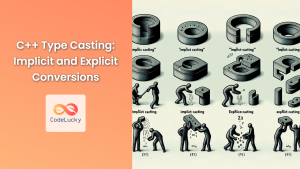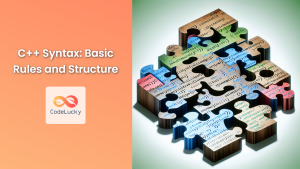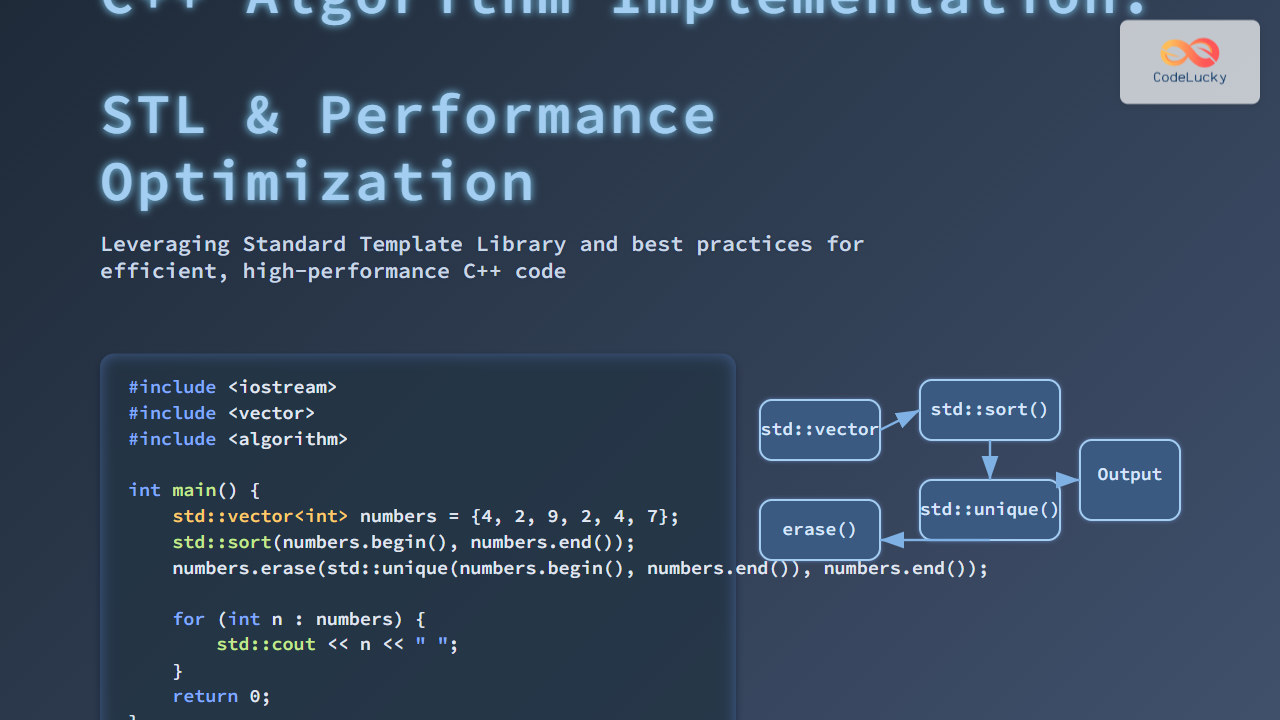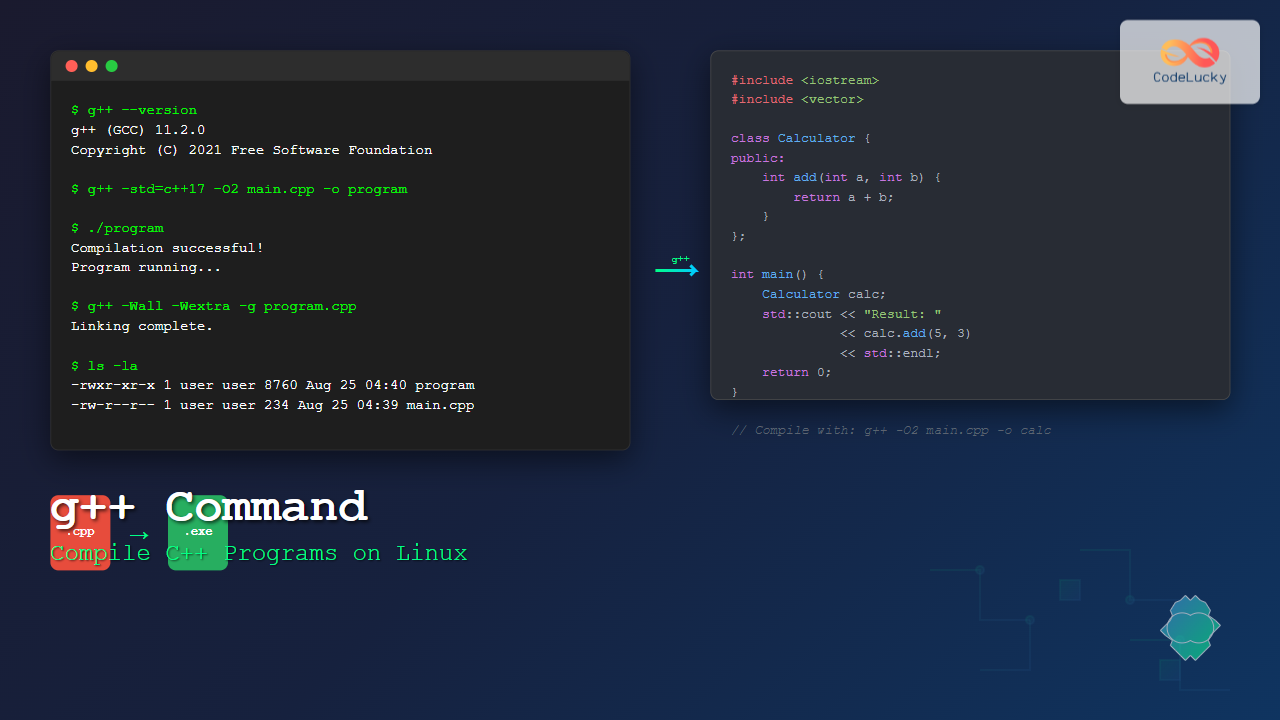In the ever-evolving landscape of C++, type deduction has become an increasingly important feature. One of the most powerful tools in this arena is the decltype specifier. Introduced in C++11, decltype allows developers to deduce the type of an expression at compile-time, opening up new possibilities for generic programming and type-safe code. In this comprehensive guide, we'll dive deep into the world of decltype, exploring its syntax, use cases, and best practices.
Understanding decltype
The decltype keyword is a type specifier that evaluates the type of an expression without actually executing it. It's particularly useful when you need to work with types that are difficult or impossible to express directly, especially in template metaprogramming.
📌 Syntax: decltype(expression)
Let's start with a simple example to illustrate how decltype works:
#include <iostream>
#include <typeinfo>
int main() {
int x = 5;
decltype(x) y = 10; // y is deduced to be of type int
std::cout << "Type of y: " << typeid(y).name() << std::endl;
std::cout << "Value of y: " << y << std::endl;
return 0;
}
Output:
Type of y: i
Value of y: 10
In this example, decltype(x) deduces the type of x, which is int, and uses it to declare y. The typeid operator is used to print the type name, which may vary between compilers but typically shows i for int.
decltype with Complex Expressions
decltype really shines when dealing with more complex expressions. Let's look at some examples:
#include <iostream>
#include <vector>
int main() {
std::vector<int> vec = {1, 2, 3, 4, 5};
decltype(vec.begin()) it = vec.begin();
decltype(vec[0]) first_element = vec[0];
decltype(vec.size()) size = vec.size();
std::cout << "Type of iterator: " << typeid(it).name() << std::endl;
std::cout << "Type of first element: " << typeid(first_element).name() << std::endl;
std::cout << "Type of size: " << typeid(size).name() << std::endl;
return 0;
}
Output (may vary depending on the compiler):
Type of iterator: N9__gnu_cxx17__normal_iteratorIPiSt6vectorIiSaIiEEEE
Type of first element: i
Type of size: m
Here, decltype is used to deduce the types of:
- An iterator (
vec.begin()) - A vector element (
vec[0]) - The size of the vector (
vec.size())
This demonstrates how decltype can handle complex expressions and member functions.
decltype and Function Return Types
One of the most powerful applications of decltype is in deducing function return types, especially for template functions. Let's explore this with an example:
#include <iostream>
#include <type_traits>
template<typename T, typename U>
auto add(T t, U u) -> decltype(t + u) {
return t + u;
}
int main() {
auto result1 = add(5, 3.14);
auto result2 = add(std::string("Hello, "), "world!");
std::cout << "Result 1: " << result1 << " (Type: " << typeid(result1).name() << ")" << std::endl;
std::cout << "Result 2: " << result2 << " (Type: " << typeid(result2).name() << ")" << std::endl;
std::cout << "Is Result 1 a double? " << std::is_same<decltype(result1), double>::value << std::endl;
std::cout << "Is Result 2 a string? " << std::is_same<decltype(result2), std::string>::value << std::endl;
return 0;
}
Output:
Result 1: 8.14 (Type: d)
Result 2: Hello, world! (Type: NSt7__cxx1112basic_stringIcSt11char_traitsIcESaIcEEE)
Is Result 1 a double? 1
Is Result 2 a string? 1
In this example, decltype(t + u) is used as the return type of the add function. This allows the function to deduce its return type based on the types of its arguments, making it highly flexible and type-safe.
decltype and References
decltype has some special rules when it comes to references. Let's examine these rules:
#include <iostream>
#include <type_traits>
int main() {
int x = 10;
int& rx = x;
const int cx = 20;
const int& crx = cx;
decltype(x) dx = x; // dx is int
decltype(rx) drx = x; // drx is int&
decltype(cx) dcx = cx; // dcx is const int
decltype(crx) dcrx = cx; // dcrx is const int&
std::cout << "dx is int? " << std::is_same<decltype(dx), int>::value << std::endl;
std::cout << "drx is int&? " << std::is_same<decltype(drx), int&>::value << std::endl;
std::cout << "dcx is const int? " << std::is_same<decltype(dcx), const int>::value << std::endl;
std::cout << "dcrx is const int&? " << std::is_same<decltype(dcrx), const int&>::value << std::endl;
return 0;
}
Output:
dx is int? 1
drx is int&? 1
dcx is const int? 1
dcrx is const int&? 1
This example demonstrates how decltype preserves references and cv-qualifiers (const and volatile) when deducing types.
The decltype(auto) Specifier
C++14 introduced decltype(auto), which combines the type deduction of auto with the reference and cv-qualifier preservation of decltype. This is particularly useful for perfect forwarding in function returns:
#include <iostream>
#include <type_traits>
template<typename T>
decltype(auto) perfect_forward(T&& t) {
return std::forward<T>(t);
}
int main() {
int x = 10;
const int cx = 20;
decltype(auto) rx = perfect_forward(x);
decltype(auto) crx = perfect_forward(cx);
std::cout << "rx is int&? " << std::is_same<decltype(rx), int&>::value << std::endl;
std::cout << "crx is const int&? " << std::is_same<decltype(crx), const int&>::value << std::endl;
return 0;
}
Output:
rx is int&? 1
crx is const int&? 1
Here, decltype(auto) ensures that the function perfectly forwards its argument, preserving references and cv-qualifiers.
decltype in SFINAE Contexts
decltype is often used in SFINAE (Substitution Failure Is Not An Error) contexts to enable or disable function overloads based on type properties. Here's an advanced example:
#include <iostream>
#include <type_traits>
#include <vector>
// Primary template
template<typename T, typename = void>
struct has_size_method : std::false_type {};
// Specialization for types with a size() method
template<typename T>
struct has_size_method<T,
std::void_t<decltype(std::declval<T>().size())>>
: std::true_type {};
template<typename T>
typename std::enable_if<has_size_method<T>::value, size_t>::type
get_size(const T& container) {
return container.size();
}
template<typename T>
typename std::enable_if<!has_size_method<T>::value, size_t>::type
get_size(const T&) {
return 0;
}
int main() {
std::vector<int> vec = {1, 2, 3};
int arr[] = {1, 2, 3, 4};
std::cout << "Size of vector: " << get_size(vec) << std::endl;
std::cout << "Size of array: " << get_size(arr) << std::endl;
return 0;
}
Output:
Size of vector: 3
Size of array: 0
In this example, decltype is used within std::void_t to check if a type has a size() method. This information is then used to enable or disable different overloads of the get_size function.
Best Practices and Gotchas
While decltype is a powerful tool, it's important to use it judiciously. Here are some best practices and potential pitfalls to be aware of:
-
🚀 Use
decltypefor complex type deductions: It's particularly useful when working with template metaprogramming or when the type is difficult to express directly. -
⚠️ Be cautious with expressions: Remember that
decltypeevaluates the type of the expression, not just the type of the variables involved. For example:int x = 0; decltype(x) a = x; // a is int decltype((x)) b = x; // b is int&The extra parentheses in
decltype((x))make it an lvalue expression, resulting in a reference type. -
🔍 Combine with
autofor flexibility: Usingdecltypewithautocan provide both convenience and precision:template<typename T, typename U> auto multiply(T t, U u) -> decltype(t * u) { return t * u; } -
🛠️ Use
decltype(auto)for perfect forwarding: As shown earlier,decltype(auto)is ideal for preserving value category and cv-qualifiers in forwarding functions. -
🎭 Be aware of temporary objects:
decltypecan sometimes deduce a reference to a temporary object, which can lead to dangling references if not handled carefully.
Conclusion
decltype is a powerful feature in C++ that enables more flexible and generic code. By allowing compile-time type deduction, it opens up new possibilities for template metaprogramming, type-safe generic functions, and more. While it requires careful use, mastering decltype can significantly enhance your C++ programming toolkit.
Remember, the key to effectively using decltype is understanding how it evaluates expressions and how it interacts with other C++ features like references, cv-qualifiers, and template instantiation. With practice and careful application, decltype can become an invaluable tool in your C++ development arsenal.
As C++ continues to evolve, features like decltype demonstrate the language's commitment to providing powerful, flexible tools for developers. By embracing these features, you can write more expressive, efficient, and maintainable code in your C++ projects.


















